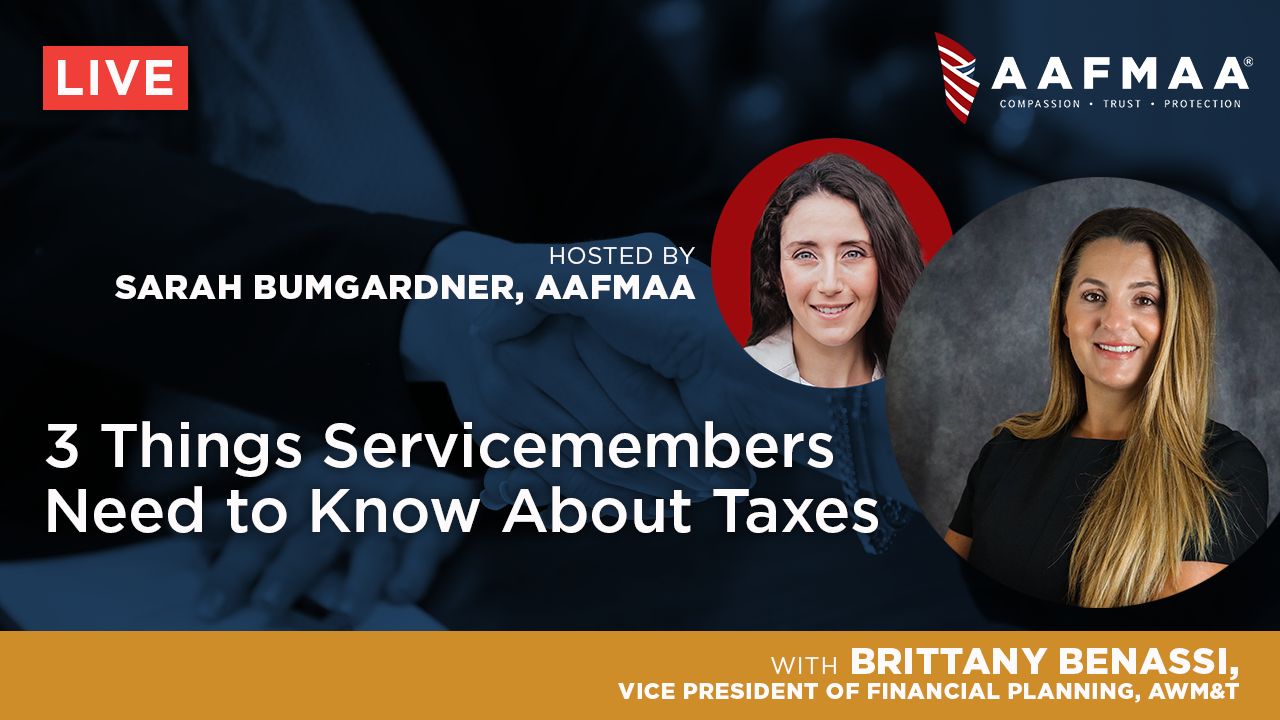Blog
- Resources
- News / Blogs
Understanding Veteran Tax Exemptions

As a Veteran, your service to our nation deserves recognition. Tax exemptions are just one way to honor that service through financial relief and security. At AAFMAA Wealth Management & Trust LLC (AWM&T), you’ll receive exclusive financial solutions as a member of the U.S. Armed Forces. You, your family, and your financial well-being are the focus of our mission. Let’s explore what Veteran tax exemptions are and how you can make the most of them.
What Are Veteran Tax Exemptions?
Veteran tax exemptions are special provisions in federal and state tax laws that offer financial benefits to those who have served in the military. These exemptions are designed to recognize and honor the sacrifices and contributions of Veterans by providing certain tax advantages. By capitalizing on these exemptions, Veterans can reduce their tax liabilities and increase their financial stability.
How to Take Advantage of Veteran Tax Benefits
Get to know the benefits available to you as a Veteran, organize your finances, and take full advantage of the below tax incentives.
Understand Federal Tax Laws on Military Retirement
One of the most significant financial benefits for Veterans is related to their military retirement pay. Under federal tax laws, military retirement pay is generally taxable, but there are exceptions. Here's what you need to know:
- VA Disability Compensation: If you receive disability compensation from the Department of Veterans Affairs (VA), this amount is tax-free. You don't need to include it as taxable income on your federal tax return.
- Combat-Related Special Compensation (CRSC): CRSC is a tax-free benefit for Veterans with combat-related disabilities. You can exclude CRSC payments from your taxable income.
- Retirement Pay Offset: Some Veterans may be eligible for a portion of their military retirement pay to be excluded from taxation if they receive VA disability compensation. This is known as the Concurrent Retirement and Disability Pay (CRDP) or Combat-Related Special Compensation (CRSC).
Know They Differ by State
Choosing the right location for retirement is an important choice. It can significantly impact how far your money is stretched, which ultimately impacts your quality of life. Some states are especially tax-friendly, such as Florida, Texas, Wyoming, South Dakota, Tennessee, and Nevada, to name a few. Tax benefits range from no tax on Social Security to Pensions to 401(k) distributions.
In addition to federal exemptions, it's essential to be aware that state tax laws regarding Veteran tax benefits vary. Some states offer more generous exemptions or additional deductions for Veterans such as a reduced property tax or eliminated property tax for those who are considered disabled by the VA. To maximize your tax benefits, research the specific tax laws in your state and consult a tax professional specializing in military tax matters.
Read the Fine Print and Apply
Understanding and applying for Veteran tax exemptions can be complex, and it's easy to overlook important details. To ensure you receive all the benefits you're entitled to, it's crucial to read the fine print in tax laws and regulations. Additionally, consider seeking the assistance of a qualified tax professional who specializes in Veteran tax matters. They can help you navigate the intricacies of tax codes and ensure you take full advantage of available exemptions.
How to Take Advantage of Disabled Veteran Tax Exemptions
If you're a disabled Veteran, there are additional tax benefits available to you.
Federal Tax Refunds
Disabled Veterans may be eligible for federal tax refunds through the Earned Income Tax Credit (EITC) or the Child Tax Credit. Depending on your income and family situation, these credits can provide substantial refunds. You must check your eligibility and claim these credits when filing your federal tax return.
State Tax Exemptions
As with regular Veteran tax exemptions, state laws regarding tax benefits for disabled Veterans differ. Many states offer property tax exemptions, reduced vehicle registration fees, or income tax deductions for disabled Veterans. Be sure to research the specific exemptions available in your state and take advantage of them.
Other Disability Options
Apart from federal and state tax exemptions, other disability-related options can impact your tax situation. For instance, if you have a service-connected disability, you may be eligible for additional benefits such as vocational rehabilitation or grants for adaptive housing. These benefits can have tax implications, so consult a tax professional to understand how they may affect your tax liability.
Maximize Your Finances with AWM&T
Understanding and leveraging Veteran tax exemptions can significantly improve your financial well-being as a Veteran. By making smart choices now, you can enjoy the benefits of your tax exemptions for years to come.
To discuss financial planning and investment management, and develop a customized, holistic strategy to protect your military family’s financial legacy, contact an AWM&T Relationship Manager today. We’ll provide you with personalized service that puts your family’s finances first. Speak to one of our military financial professionals, or give us a call at 1-910-307-3500.
About Us
Founded in 2012, AAFMAA Wealth Management & Trust LLC (AWM&T) was created to meet the distinct financial needs of military families. We proudly deliver experienced, trustworthy financial planning, investment management, and trust administration services – all designed to promote lasting security and independence.
We are proud to share the mission, vision, and values of Armed Forces Mutual, our parent company. We consistently build on the Association’s rich history and tradition to provide our Members with a source of compassion, trust, and protection. At AWM&T, we are committed to serving as your trusted fiduciary, always putting your best interests first. Through Armed Forces Mutual's legacy and our financial guidance, we provide personalized wealth management solutions to military families across generations.
Get In Touch!
Schedule a consultation with one of our expert financial planners today, and let's hit the fast-track to success!
Schedule A Consultation


